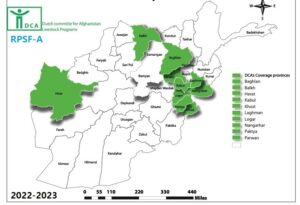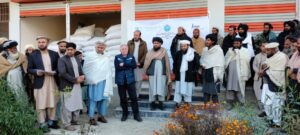Address:
- Street # 5 of Syloo, House # 152-153, District 3, Kabul, Afghanistan
- info.afg@dca-af.org
- Sun - Thu: 8.00 AM to 4.00 PM
Project: Rural Poor Stimulus Facility – Afghanistan (RPSF-A)
Donor: IFAD
Project Duration: 11 Months
Project Timeline: 7 November 2022 – 30 September 2023
Targeted Beneficiaries: 64,350 HHs
Geographic location: 10 Provinces (Parwan, Kabul, Logar, Khost, Nangarhar, Laghman, Paktiya, Herat, Balkh and Baghlan).
Project Goal: Impacts of COVID-19 on 64,350 vulnerable households (HH) in the country is minimized.

Afghanistan is in the midst of a severe economic crisis, likely to exacerbate food shortages and other forms of hardship for vast swathes of its population. FSAC[1] (2022) reported that over 24 million people of Afghanistan either fall under IPC[2] phase 3 or above due to a number of complex crises including the COVID-19 pandemic, drought, change of government, and collapse of the banks. The livestock sector that drives food security and livelihoods of 80% of the population and the source of transformation and inclusive growth are most affected. More than 41% of the population reported a decrease in the number of livestock while other analyses indicated more than 60% of the livestock are under critical conditions due to feed shortage, animal health and market failure requiring urgent response (food security cluster, 2021[3]). This provides strong justification for IFAD’s response for continuing engagement in the country.
Considering that IFAD cannot engage with the de facto government authorities, the implementation of RPSF-financed activities will be carried out by the Dutch Committee for Afghanistan through a grant agreement with IFAD. DCA has been a long time implementing partner for the Afghanistan government under the IFAD financed CLAP Project.
The implementation of both RPSF1 and RPSF 2 (which is now called RPSF – Afghanistan) will not change the fundamental project design in terms of outcomes, outputs and indicators, except that the outreach will increase, and a revised budget breakdown was agreed with relevant counterparts.
The additional funds available under RPSF – Afghanistan will be used for scaling up existing activities under RPSF 1, in terms of geographical coverage, and the beneficiaries target group. The current project focuses on the nomadic Kuchi and smallholder milk producers bearing in mind the disruption in their access to veterinary services, animal feed and access to markets especially for the perishable dairy products as a result of the pandemic. The project is targeting small producers and value chain actors along the milk sector and mainly in 3 provinces, with additional 3 other surrounding provinces following their nomadic trails. In this scenario an additional 60,000 Kuchi household beneficiaries, and an additional 4,350 milk collectors and sellers.
The project is intended to strengthen the targeting strategy and mainstreaming of women and youth who play an important role in the agriculture and livestock sector and as one of the most vulnerable community groups due to the Covid-19 pandemic. In particular, the project will identify new targeted beneficiaries from the following: (a) Kuchi households including female-headed households who do not have access to veterinary services, sufficient feed resources, and are more vulnerable; (b) Kuchi households from whom youth have returned to the tribe because of loss of their jobs and are facing hardship; (c) dairy producers whose access to markets has been disrupted; (d) market players including youth who are involved in the processing and marketing of dairy products; and (e) traders and managers of the livestock markets.
The RPSF – Afghanistan will support the same activities that were included in RPSF 1 under the two components namely:
Moreover, the proposed provision of additional financing under RPSF Afghanistan is a response to the customary leaders’ and communities’ requests. The project will promote better synergies with other agencies and organizations currently operating in the country for humanitarian activities and related essential livelihood projects, and duplication of efforts will be avoided. The original and newly proposed activities demonstrate IFAD’s commitment to go beyond “doing no harm” to maximizing development gains.
DCA will prepare a knowledge management (KM) and exit strategy for the project. The KM strategy will build on the experience of DCA working in previous IFAD-financed projects in the country through a participatory approach with beneficiary and project stakeholders.

[1] FSAC – Food Security and Agriculture Cluster of Afghanistan
[2] IPC – Integrated food security phase classification
[3] Food Security Cluster (2021), IPC Acute Food Insecurity Analysis, Sept 2021-March 2022, Issued in October 2021.

Leave A Comment